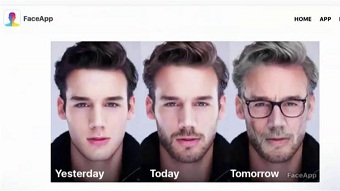A photo editing app has introduced a few new wrinkles to the faces of celebrities — and to the ongoing discussion around personal digital security. FaceApp, a more than 2-year-old app created by a Russia-based developer, has seen a recent spike in use due to some celebrities and influencers taking part in the “FaceApp Challenge.”
The app has a host of image-altering features such as adding a smile or appearing to change a person’s gender. Those taking part in the challenge are using the app to make themselves appear elderly, giving fans a preview of what their favorite athletes or celebrities would look like once they become senior citizens. The recent spike in traffic to FaceApp has also given way to memes about certain famous faces who never seem to age, like the actors Paul Rudd and John Stamos.
But the sudden popularity of the app has also triggered growing concerns about how apps use the data and images supplied by users, particularly those that are owned or operated outside the U.S. One such concern for FaceApp centered on whether the app could access user photos without permission. Researchers found that those concerns were unfounded.
Despite the exoneration, security experts have mixed feelings about the app. They said it isn’t likely the app is stealing entire camera rolls of photos from its users, but added FaceApp is not completely risk free.
The Democratic National Committee felt the app posed enough of a risk to send an alert to its party’s presidential campaigns, warning against using the app that was “developed by Russians”. The warning was first reported by CNN.
Senate Minority Leader Chuck Schumer, D-N.Y., also sent a letter to the Federal Trade Commission and the Federal Bureau of Investigation, asking the agencies to investigate the app. Schumer wrote that he has “serious concerns regarding both the protection of the data that is being aggregated as well as whether users are aware of who may have access to it.”
Justin Brookman, Director of Privacy and Tech Policy at Consumer Reports, said the app’s user agreement should concern its fans. “I would be cautious about uploading sensitive data to this company that does not take privacy very seriously, but also reserves broad rights to do whatever they want with your pictures,” said Brookman, a former policy director for the Federal Trade Commission’s Office of Technology Research and Investigation.








